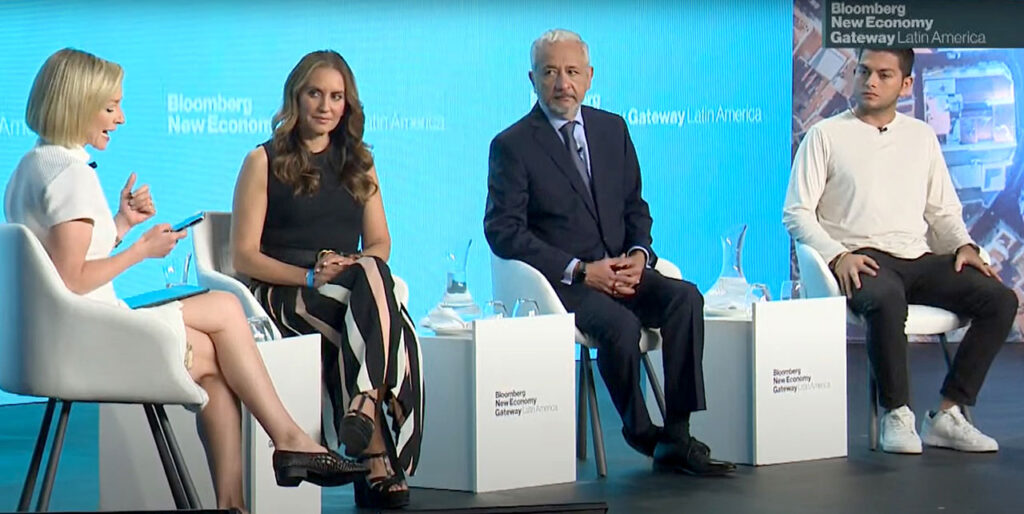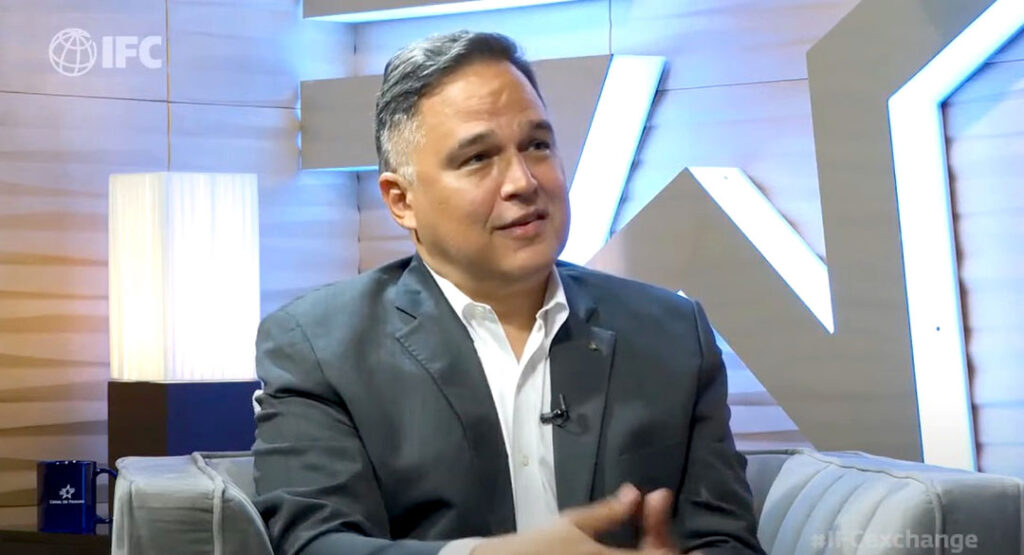Boosting Economic Growth and Sustainable Supply Chains
Panama Canal Administrator Ricaurte Vásquez Morales and Vice President of Finance Víctor Vial were invited to speak at events organized […]
Panama Canal Administrator Ricaurte Vásquez Morales and Vice President of Finance Víctor Vial were invited to speak at events organized by the International Finance Corporation (IFC) and Bloomberg. Both discussions offered a glimpse of the Canal’s perspective on the opportunities for the Latin American region and the importance of investing in sustainable and inclusive growth.
Advocating for sustainable development in Latin America
World leaders gathered in Panama for Bloomberg’s New Economy Gateway, a conference that explored growth opportunities in Latin America. The Panama Canal Administrator participated as a panelist to speak on “Supercharging Supply Chains,” along with other leaders in the logistics industry.

In addition to highlighting Panama’s important role as a trade and logistics hub, Administrator Vasquez underscored sustainability as the key to the region’s future growth.
“In general, demand is requiring more sustainable products,” the Administrator said during his panel. “Not only do we have the opportunity to invest to reduce our carbon footprint, but also the opportunity to value our service according to that market, a new emerging market for the world and the region.”
The Administrator emphasized that growth also brings with it a responsibility to the environment and local populations. “One of the elements that has demonized the struggle of globalization is who got left behind. And making sure everyone gets to the next level is important,” said Administrator Vasquez. “Avoiding isolation is critical to being part of the greater flow of trade and services.”
“There are three main elements we’re looking at: carbon neutrality, water resources and high technology to accommodate more ships on existing infrastructure,” he said. “That will require some additional investments that may seem non-traditional for the Panama Canal, but I think this is the next stage we need to follow to remain competitive.”
Promoting environmental solutions through strategic partnerships
The Canal is no stranger to pursuing ambitious, long-term goals, as it did with the Panama Canal Expansion Program, which opened in 2016. And like the financing process for the expanded Canal, being carbon neutral will be a colossal task, one that will require organizations to put not only sustainability, but also resilience at the heart of their operations.

Victor Vial, Vice President for Finance of the Panama Canal, recently spoke at the IFC Sustainability Exchange, a series of virtual events focused on “Sustainable Finance for Climate and Social Impact.” Vial stressed the need to invest in water management, technology, infrastructure and optimized operations, and the importance of cross-sector collaboration to discover and accelerate innovative solutions to the global challenge of climate change.
“It won’t be easy, but it will be worth it, and we believe we need to lead by example,” Vial said.
“We see that as a responsibility of the Canal, given its role in the industry, to incentivize our customers to do everything they can to make the necessary investments to address this [environmental] challenge.”
The Canal, like many other operations around the world, faces key challenges in adapting infrastructure, communities, businesses and people to the inevitable impacts of climate change. The development of sustainable financial tools can incentivize customers, stakeholders, international organizations and governments to integrate sustainability into economic development.
As the Canal drives more green programs, such as expanded reforestation and sustainable agriculture programs, as well as more energy-efficient operations, it will need the support of its partners.
“We don’t think it’s fair that someone who has made significant investments in their fleet to be carbon efficient should pay the same as someone who hasn’t made any investments,” Vial said. “We want to make sure that our pricing strategy reflects that and that sustainability is part of our decision-making process.”
Progress toward decarbonization and water resilience.
These meetings of world leaders and the growing calls for climate action reaffirm the Panama Canal’s continued advocacy for more sustainable supply chains. The Canal understands that its survival and responsibilities can no longer be separated from sustainable and climate-resilient investments.
The Canal is already inherently a sustainable organization: last year, it saved the world 16 million tons of CO2 emissions by operating a reliable and safe shortcut for ships. However, the Canal is also working to make its own operations as low-carbon and resilient as possible.
Last May, the Canal received the ‘Top 50‘ seal from the Ministry of the Environment (MiAmbiente) for its early leadership in driving the decarbonization of the interoceanic waterway. Since the Canal announced its carbon neutral goal last year, it has developed feasible targets to reduce emissions in its own operations and those of its customers. It also recently initiated a pilot program to invest in hybrid tugboats and electric vehicles, reducing emissions from its transport fleet. The interoceanic waterway is including additional methods to phase out the use of fossil fuels and integrate clean energy projects, energy efficiency measures and conservation programs.